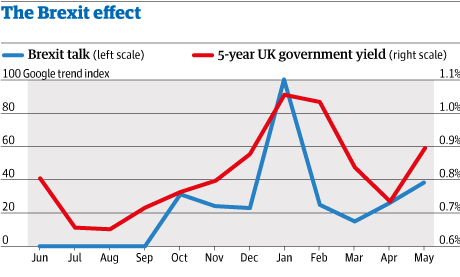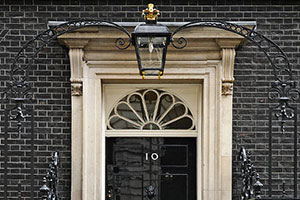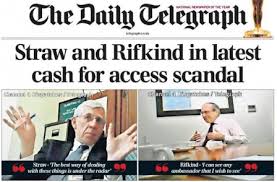
The issue of whether the government would allow Parliament a vote (it seems as though it will) and whether any such vote will be meaningful (it won’t be) has dominated Brexit coverage since the referendum. This has been a distraction from the main event – not least because the EU Withdrawal Act makes any vote meaningless. When the Conservatives and Labour whipped their MPs in the same direction, they whipped away Parliament’s power and gave it to the EU and UK government.
The place where Parliament has actually had most success is not taking back control of what’s happening, but actually finding out what’s going on (or not going on). This was symbolised by the apparent success last month in forcing the government to release the 58 studies about the likely economic impact of Brexit.
MPs and the public first got wind of these ‘studies’ back in the summer when David Davis mentioned them on the Andrew Marr show: (see p.11 of this transcript):
“That data’s being gathered, we’ve got 50, nearly 60 sector analyses already done, we’ve got planning work going on in the customs, we’ve got planning work going on 22 other issues which are critical, 127 all told. All of them have got to be grounded before we come to a conclusion what it looks like.”
Repeated FOI requests for the studies by the MEP Molly Scott Cato and others failed, as the government appeared to argue it would undermine their ability to negotiate (and there are certain protections under FOI that might support this rather bland statement).
In November, Labour then used an obscure piece of parliamentary procedure to force the government into releasing its Brexit impact studies, as this blog by Andrew Defty explains. Using a motion for a return, Labour ‘transformed a non-binding opposition day motion into a binding resolution of the House’ (see more on these here in this 1999 report Section 3 (ii)).
However, the government then responded with an admission (or confession) that the ’50’ or ‘60’ – or possibly 127 – pieces of analysis are not what they seem: “As we have made clear, it is not the case that 58 sectoral impact assessments exist”. The statement went on to explain that the papers are a
“… wide mix of qualitative and quantitative analysis, contained in a range of documents developed at different times since the referendum. It examines the nature of activity in the sectors, how trade is conducted with the EU currently in these sectors and, in many cases, considers the alternatives after we leave as well as looking at existing precedents. This analysis ranges from the very high level overarching analysis to sometimes much more granular level analysis of certain product lines in specific sectors.”
At some point, a discerning reader could conclude, Davis was being ‘economical with the truth’. Either the impact studies exist (or existed) in some form, or they didn’t. It now seems that ‘Brexit studies’ doesn’t mean, as it were, ‘Brexit studies’. And whatever they are, they won’t be fully released (though the ultimate power may lie with the DExEU committee here).
Back in July of 2016, when Brexit meant Brexit and Theresa May had a majority, her new government asserted that it was for government to declare and trigger article 50 and then conduct the subsequent negotiations in a confidential way. The government were keen to keep things closed and secret. There was to be, famously, no running commentary.
In September 2016 Davis, the new secretary of state for Brexit, made it clear the limitations of any openness, saying he would be “as open as I can. More accurately, the Government will be as open as they can”. He argued that it may be ‘the most complicated negotiation ever’ but there would be ‘debates, reports by Select Committees and hearings’ and he promised:
“We will certainly match and, hopefully, improve on what the European Parliament sees. At given times, that will be tactical, I am afraid. I do not want to be boring about it, but this is likely to be the most complicated negotiation of modern times. It may be the most complicated negotiation of all times. By comparison, Schleswig-Holstein is an O-level question. We will not always be entirely free agents, but we will be as open as we can be.”
He also spoke of the impossibility of secrecy:
“… I will seek to be as open as is possible…Even were I to decide that I was going to behave like Rasputin and keep it all entirely secret, I would fail. It would not be possible… other Governments would do it. In the Government’s own interest, it is a better idea to be more open than is perhaps traditional, but always subject to the overriding point that we cannot pre-empt the negotiation.”
In October the report from the House of Lords EU Select Committee took a rather stronger view of what right Parliament had (2016).
“One of the key objectives of parliamentary scrutiny is to ensure transparency – to cast a light on the actions of the executive. It is, we suggest, essential that many elements of the forthcoming negotiations – for instance, negotiations affecting acquired rights, or future cooperation between UK and EU police forces—should be conducted transparently.” (House of Lords EU 2016a).
Since then, Parliament has been the key to shining more light on Brexit. The sheer volume of investigation and scrutiny can be seen below:
Scrutiny of Brexit by Parliament, 13 July 2016 – 19 June 2017
| Written questions | 490 |
| Written answers | 819 |
| Select committee inquiries begun | 55 |
(House of Commons/UK Parliament: IFG)
Select committees launched more than 55 inquiries into various aspects of Brexit, though some were curtailed by the June 2017 General Election. In December 2016, the Liaison Committee was the first body to subject the Prime Minister to detailed scrutiny of the government position on Brexit revealing, perhaps inadvertently, that her approach was one of secrecy and that she appeared unaware of how exactly article 50 functioned. In one day in November 2017, in a ‘bumper day for select committees’, six select committees questioned different officials and Ministers on various aspects of Brexit. In March 2017, the new DExEU Select Committee scrutinised the government’s objectives and positions and questioned Davis, who confessed there had been no preparation for what would happen in the event of Brexit talks breaking down and that any financial settlement will favour the EU. The debate around the European Union (Notification of Withdrawal) bill from January to March 2017, triggered by the Supreme Court ruling, also gave a focus to discussion and debate and revealed more about the prospects and government plans.
All this pressure has given us far more information that the government seemed prepared to give before. We have had two major Prime Ministerial speeches and one, heavy, evidence session (with another due December 20 this year). Ministers have appeared and explained (and sometimes contradicted each other) regularly. We’ve also had a Brexit White Paper (that, you’ll be pleased to know, gave us all 14 weeks holiday a year).
Brexit has not, of course, been fully opened up by Parliament. The government refused some of the more transparent options, such as a cross-party approach via Royal Commission, in 2016 and again in 2017. The January White Paper was described as ‘largely devoid of content because the UK government’s concern about negotiating secrecy’ and offered ‘as few concrete positions as it is possible to imagine’. The government also resisted Parliamentary motions to mandate regular updates on Brexit to Parliament in the future.
Nevertheless, Parliament was key in forcing appearances. Far more is known than before, and benchmarks have been lain down with the legislature’s action leading to far greater understanding of the government’s views and preparation. And here is what has proved so damaging: the lack of preparation. Westminster’s digging and pressure have revealed not what has been done but what has not been done. There is no hidden grand plan, but a void at the heart of government thinking on the most important event in the last 60 years. And this is what the ‘58’ studies symbolise. As General Montgomery once said: “I have not been told of any master plan and I must therefore assume there was none.”








